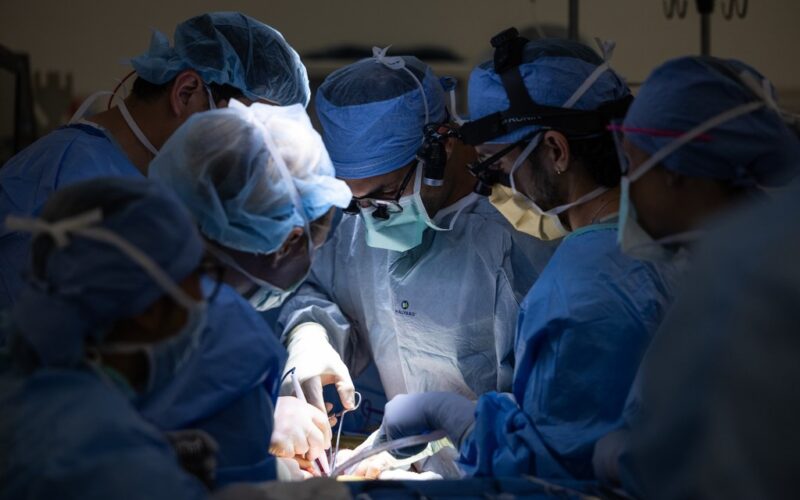Surgeons in California have performed the first ever human bladder transplant — and the recipient is now off dialysis after a procedure that could revolutionize treatment for people whose own organ has been damaged by illness or is malformed, the University of California announced Sunday.
Urologic transplant surgeon Dr. Nima Nassiri, who leads the UCLA Vascularized Composite Bladder Allograft Transplant Program, and Dr. Inderbir Gill, founding executive director of USC Urology, performed the surgery on May 4 at Ronald Reagan UCLA Medical Center, UCLA said in a statement.
The patient was Oscar Larrainzar, a 41-year-old father of four who had been on dialysis for seven years and was out of options. Most of his bladder had been removed due to a rare cancer, leaving a portion too small to function. He had also lost both kidneys to cancer and end-stage renal disease, the doctors said.
Nick Carranza / UCLA Health
Nima Nassiri, MD (left) and Inderbir Gill, MD (right) performed the historic surgery. (Nick Carranza / UCLA Health)
Nassiri and Gill had worked together for years to develop the surgical technique. During an eight-hour surgery, they transplanted first a kidney, then the bladder, from the same donor. Then they connected the two.
“The kidney immediately made a large volume of urine, and the patient’s kidney function improved immediately,” Nassiri said in UCLA’s statement. “There was no need for any dialysis after surgery, and the urine drained properly into the new bladder.”
Larrainzar was one of millions of people worldwide whose bladder is too diseased or damaged to function, causing everything from unremitting pain to constant infections, among other complications. Current best options include creating a new bladder out of a portion of intestine. But that carries a risk of infection, given that the tissue used is bacteria-ridden by virtue of being intestinal. Internal bleeding and digestive issues can also result.

Nick Carranza / UCLA Health
Transplant recipient Oscar Larrainzar, whose bladder was non-functioning and who previously had both kidneys removed, rests in a hospital bed at UCLA before surgery. (Nick Carranza / UCLA Health)
The main risks from transplant are the need for immunosuppressant drugs, and the potential for rejection. The transplant was part of a clinical trial that Gill and Nassiri plan to continue, with the hope of adding bladders to the list of transplantable organs.
Nassir called the surgery a “historic moment in medicine.” Larrainzar called it a life-saver.
“I was a ticking time bomb,” Larrainzar told The New York Times. “But now I have hope.”








